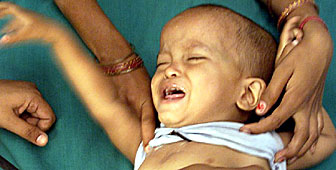Abortion and death penalty mark UN child talks

A United Nations conference on children ended on Saturday amid a row over United States opposition on issues of abortion and the death penalty.
After three days of debate, delegates from more than 180 countries agreed on 21 new goals to help children.
They included targets over the next 15 years for improving health, education, broadening the fight against Aids and protecting children from abuse, exploitation and violence.
However, delegates struggled to frame a final document that did not offend the US, many Islamic nations and the Vatican on the issue of sexual reproduction.
The source of disagreement was the Bush administration’s stand against abortion, and its promotion of abstinence as a solution for unwanted pregnancies and Aids.
Washington also pushed the conference into dropping a globally-binding prohibition against the execution of children.
Critics from around the world, lamented the US-led changes, with some saying the document had fallen short of its aims.
Swiss frustration
Jean-François Giovannini, the head of Switzerland’s delegation to the conference, told swissinfo on Friday that the meeting had been a success, other than for the US demands.
“Of course abstinence is the choice of the person…it’s his or her problem. But it’s not up to us to decide whether they want to have a sexual relationship or not, ” he said.
“We have to provide them with facilities so they can be informed and make their own choices about how they want to have their sexual life.”
“We have to give them the means to protect themselves.”
Giovannini said the US had isolated itself from most other countries at the conference.
“But…they are not totally isolated. I think they still have a few friends who follow the same line, like Sudan for instance.”
Over a decade of child rights
This week’s meeting – originally scheduled for September 2001, but postponed following the terror attacks on New York – was the first opportunity for the world community to review a series of goals it set in 1990.
They included halting state-perpetrated violence against children, and eradicating child poverty, sexual exploitation and labour.
Of some 27 targets set, the UN considers six to have been reached, 12 to have made “some progress”, three to have made “no progress at all” and six to be inconclusive.
In a report released in April, the UN said successes include the global eradication of polio, a halving of diarrhoea-caused fatalities and the “virtual elimination” of iodine deficiency disorders.
By contrast, the report said little progress had been made on halving maternal mortalities, at least 150 million children remain malnourished, and growing numbers fall victim to wars, sexual abuse and preventable illness.
Swiss authorities must tackle new challenges
Giovannini said Switzerland’s own performance in protecting the rights of children had room for improvement.
“We have exploitation of children in that Swiss tourists go to developing countries to exploit children physically, and this is something that has increased over the last five years,” he said.
“You have the internet pedophilia, even the sale of organs, and many new forms of exploitation.
“I think the police and legal system have to adapt themselves to this new situation.”
By Jacob Greber

In compliance with the JTI standards
More: SWI swissinfo.ch certified by the Journalism Trust Initiative
You can find an overview of ongoing debates with our journalists here . Please join us!
If you want to start a conversation about a topic raised in this article or want to report factual errors, email us at english@swissinfo.ch.